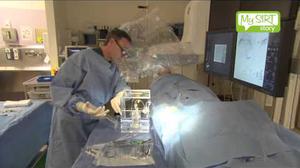
SIRT Approved for Routine Commissioning on the NHS
NHS England have announced that from April 2019 selective internal radiation therapy (SIRT) using yttrium-90 microspheres will be available as a routinely commissioned NHS treatment for patients with advanced bowel cancer that has spread to the liver and is not responding to standard chemotherapies.
SIRT was evaluated by NHS England as part of the Commissioning through Evaluation (CtE) scheme from January 2014 to March 2017 and the results were published by NICE and NHS England on the NHS England website in October 2017. The findings were also published online as a full scientific paper in the journal Clinical Oncology by Professor Sharma and his colleagues in September 2018, confirming that the real-world experience of SIRT in the NHS is consistent with the published literature.1
Since 2017, NHS England has been considering the case for routine commissioning of this treatment and they have reached the conclusion that the evidence is sufficient to offer it as a routine treatment for patients with colorectal cancer that has spread to the liver who meet certain criteria.
In the Clinical Commissioning Policy paper: Selective Internal Radiation Therapy (SIRT) for chemotherapy refractory/intolerant metastatic colorectal cancer (adults), NHS England recommends that adults with chemotherapy refractory or chemotherapy intolerant unresectable, liver-only metastatic colorectal cancer that meet all of the eligibility criteria will be able to be treated with SIRT using yttrium-90 microspheres.2
For patients with advanced bowel cancer, patients will have to meet certain criteria to be eligible for the treatment on the NHS. Specialist liver centres in England which satisfy the criteria specified by NHS England will be able to routinely offer this procedure.
The liver metastases should not be operable and the disease should not be responding to standard chemotherapies. For patients with other cancers that may benefit from SIRT, such as primary cancers of the liver, the policy proposals are still being reviewed.
Patients who do not qualify for this treatment by the NHS criteria may be able to receive SIRT by participating in a clinical trial, by submitting Individual Funding Requests via their Oncologist, or pay for it privately. Since the NHS withdrew the treatment in April 2017 in order to evaluate the clinical data, many bowel cancer patients have turned to crowdfunding to fund SIRT privately.
Professor Ricky Sharma, Chair of the SIRT Users Network, said:
"The news today from NHS England is an enormous relief for patients with bowel cancer who meet the criteria and the commissioning decision has taken a painfully long time. We have known since NHS England and NICE published their findings in October 2017 that the real-world experience of SIRT as a treatment of cancer in the NHS is consistent with the published data from other countries."
"My thoughts are with those patients who meet the clinical criteria NHS England have stated as ‘suitable for this treatment,’ but who needed treatment between April 2017 and March 2019 when it was not available on the NHS and who were unable to fund the treatment privately or raise the funds to receive it."
"Unfortunately, patients with advanced bowel cancer that has spread to the liver do not have the luxury of time – they cannot wait for several months for treatments such as SIRT. It is a relief that we can now offer this treatment to NHS patients again, as we were doing from 2012 until 2017, albeit now a limited group of patients who meet NHS England’s current clinical criteria."
Professor Sharma added, "I think there is still scope for improving access to this specialist treatment for patients with a variety of cancers, not just bowel cancer, and across all the nations of the UK, not just England."
References:
- White J, Carolan-Rees G, Dale M, Morgan HE, Patrick HE, See TC, Beeton EL, Swinson DEB, Bell JK, Manas DM, Crellin A, Slevin NJ, Sharma RA. Analysis of a National Programme for Selective Internal Radiation Therapy for Colorectal Cancer Liver Metastases. Clin Oncol (R Coll Radiol). 2018 Oct 5. pii: S0936-6555(18)30438-2. doi: 10.1016/j.clon.2018.09.002.
- Clinical Commissioning Policy: Selective internal radiation therapy (SIRT) for chemotherapy refractory / intolerant metastatic colorectal cancer (adults). NHS England Reference: 170102P - https://www.england.nhs.uk/wp-content/uploads/2018/12/Selective-internal-radiation-therapy-for-chemotherapy-refractory-intolerant-metastatic-colorectal-cancer.pdf. Last accessed 10th January 2019
NHS SIRT in the UK
The NHS England Commissioning through Evaluation (CtE) scheme has now closed and patients are not currently eligible to receive SIRT funded by the NHS. The data that have been collected over the past three years are currently being evaluated by NHS England to make a commissioning decision in late 2017 or early 2018. We will include all details on the website when this decision is made by NHS England.
From 1st April 2017, SIRT is no longer available on the NHS for patients meeting the eligibility criteria. Individual Funding Requests can be made by a cancer specialist for patients, but there is no obligation for the NHS to fund such requests.
At present, SIRT is not routinely available on the NHS in Wales and Northern Ireland, but may be accessed as part of a clinical trial or by making an application for its use under exceptional circumstances.
Other ways to access SIRT treatment
SIRT is routinely funded by all the major health insurers in the UK and patients can also choose to pay for the costs of the treatment themselves.
It is important that you speak with your treating clinician to discuss and explore these options if they are available locally.
Alternatively, to contact our specialist team, please click on the contact form and email us directly if you have any queries about accessing SIRT. Since it is important to assess all potential referrals as quickly as possible, we will respond to all queries within 1-2 working days.
What does the NHS say about SIRT?
Recommendations are made to the NHS about what treatments should be used by an organisation called the National Institute for Health and Care Excellence (NICE). NICE has reviewed SIRT for use in patients with liver cancer that has spread from the bowel that cannot be treated by surgery. It concluded that:
- SIRT is safe
- SIRT can delay the progression of the disease
- In some cases liver tumours shrunk so much that they could be surgically removed
- More research is needed to understand about improvement in survival and quality of life1
- National Institute for Health and Care Excellence. Selective Internal Radiation Therapy for non-resectable colorectal metastases in the liver. NICE interventional procedure guidance 401. May 2013
NHS SIRT treatment centres:
Addenbrooke’s Hospital
Cambridge University Hospitals NHS Foundation Trust Cambridge
Biomedical Campus
Hills Road
Cambridge
CB2 0QQ
Royal Infirmary of Edinburgh
51 Little France Crescent
Old Dalkeith Road
Edinburgh
EH16 4SA
King’s College Hospital
Denmark Hill
London
SE5 9RS
Nottingham City Hospital
Hucknall Road
Nottingham
NG5 1PB
Queen Elizabeth Hospital
Queen Elizabeth Medical Centre
Edgbaston
Birmingham
B15 2TH
University Hospital Southampton
Tremona Road
Southampton
Hampshire
SO16 6YD
St James' Hospital
Beckett Street
Leeds
West Yorkshire
LS9 7TF
The Christie
Wilmslow Road
Manchester
M20 4BX
The Churchill Hospital
Old Road
Headington
Oxford
OX3 7LE
The Freeman Hospital
Freeman Road
High Heaton
Newcastle Upon Tyne
Tyne and Wear
NE7 7DN
The Royal Free Hospital
Pond Street
London
NW3 2QG

NHS SIRT in the UK
The NHS England Commissioning through Evaluation (CtE) scheme has now closed and patients are not currently eligible to receive SIRT funded by the NHS. The data that have been collected over the past three years are currently being evaluated by NHS England to make a commissioning decision in late 2017 or early 2018. We will include all details on the website when this decision is made by NHS England.
From 1st April 2017, SIRT is no longer available on the NHS for patients meeting the eligibility criteria. Individual Funding Requests can be made by a cancer specialist for patients, but there is no obligation for the NHS to fund such requests.
At present, SIRT is not routinely available on the NHS in Wales and Northern Ireland, but may be accessed as part of a clinical trial or by making an application for its use under exceptional circumstances.
SIRT is available through the NHS in England and Scotland for patients with:
- Liver cancer that has spread from the bowel where all other routine approaches, such as surgery and chemotherapy, have been unsuccessful
- Bile duct cancer patients who have been previously treated
For any other type of cancer an application can be made under exceptional circumstances but there is no obligation for the NHS to fund the treatment.
For patients that meet the NHS criteria above, SIRT can be obtained by a doctor’s referral to one of the eleven NHS approved hospitals that are listed below.
If you find that you are having to wait a long time to be treated with SIRT at your nearest hospital, it is possible for your doctor to refer you to another NHS SIRT approved hospital that may have a shorter waiting list so you can be treated more quickly.
SIRT is not routinely available on the NHS in Wales and Northern Ireland but may be accessed as part of a clinical trial or by making an application for its use under exceptional circumstances. If you are having problems accessing SIRT, you may be able to seek further advice on other options from one of the support groups in the ‘Ask an expert’ section.
What does the NHS say about SIRT?
Recommendations are made to the NHS about what treatments should be used by an organisation called the National Institute for Health and Care Excellence (NICE). NICE has reviewed SIRT for use in patients with liver cancer that has spread from the bowel that cannot be treated by surgery. It concluded that:
- SIRT is safe
- SIRT can delay the progression of the disease
- In some cases liver tumours shrunk so much that they could be surgically removed
- More research is needed to understand about improvement in survival and quality of life1
- National Institute for Health and Care Excellence. Selective Internal Radiation Therapy for non-resectable colorectal metastases in the liver. NICE interventional procedure guidance 401. May 2013
NHS SIRT treatment centres
Addenbrooke’s Hospital
Cambridge University Hospitals NHS Foundation Trust Cambridge Biomedical Campus,
Hills Road
Cambridge
CB2 0QQ
Royal Infirmary of Edinburgh
51 Little France Crescent
Old Dalkeith Road
Edinburgh
EH16 4SA
King’s College Hospital
Denmark Hill
London
SE5 9RS
Nottingham City Hospital
Hucknall Road
Nottingham
NG5 1PB
Queen Elizabeth Hospital
Queen Elizabeth Medical Centre
Edgbaston
Birmingham
B15 2TH
University Hospital Southampton
Tremona Road
Southampton
Hampshire
SO16 6YD
St James' Hospital
Beckett Street
Leeds
West Yorkshire
LS9 7TF
The Christie
Wilmslow Road
Manchester
M20 4BX
The Churchill Hospital
Old Road
Headington
Oxford
OX3 7LE
The Freeman Hospital
Freeman Road
High Heaton
Newcastle Upon Tyne
Tyne and Wear
NE7 7DN
The Royal Free Hospital
Pond Street
London
NW3 2QG

There are three ways in which you can get SIRT treatment:





























